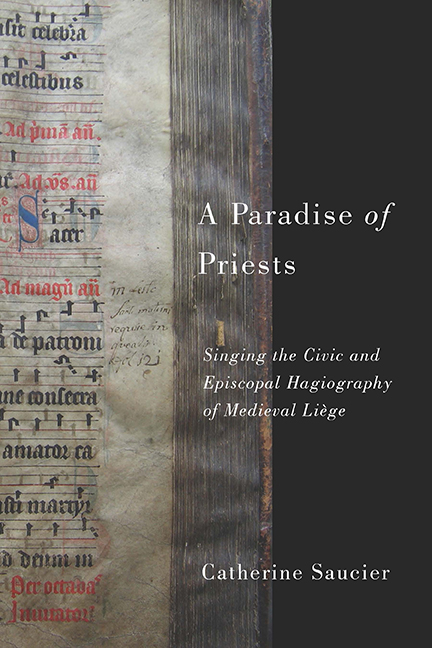Book contents
- Frontmatter
- Dedication
- Contents
- List of Illustrations
- Acknowledgments
- Abbreviations
- Note on Editorial Conventions
- Introduction: The Sound of Civic Sanctity in the Priestly Paradise of Liège
- 1 Martyred Bishops and Civic Origins: Promoting the Clerical City
- 2 The Intersecting Cults of Saints Theodard and Lambert: Validating Bishops as Martyrs
- 3 The Civic Cult of Saint Hubert: Venerating Bishops as Founders
- 4 Clerical Concord, Disharmony, and Polyphony: Commemorating Bishop Notger's City
- 5 Military Triumph, Civic Destruction, and the Changing Face of Saint Lambert's Relics: Invoking the Defensor Patriae
- Conclusion: Hearing Civic Sanctity
- Appendix: Service Books Preserving the Medieval Chant Repertory Sung in the City of Liège
- Notes
- Bibliography
- Index
3 - The Civic Cult of Saint Hubert: Venerating Bishops as Founders
Published online by Cambridge University Press: 15 March 2018
- Frontmatter
- Dedication
- Contents
- List of Illustrations
- Acknowledgments
- Abbreviations
- Note on Editorial Conventions
- Introduction: The Sound of Civic Sanctity in the Priestly Paradise of Liège
- 1 Martyred Bishops and Civic Origins: Promoting the Clerical City
- 2 The Intersecting Cults of Saints Theodard and Lambert: Validating Bishops as Martyrs
- 3 The Civic Cult of Saint Hubert: Venerating Bishops as Founders
- 4 Clerical Concord, Disharmony, and Polyphony: Commemorating Bishop Notger's City
- 5 Military Triumph, Civic Destruction, and the Changing Face of Saint Lambert's Relics: Invoking the Defensor Patriae
- Conclusion: Hearing Civic Sanctity
- Appendix: Service Books Preserving the Medieval Chant Repertory Sung in the City of Liège
- Notes
- Bibliography
- Index
Summary
Hubertus ipse est praesul et parens tuus,
Beata tanto conditore Legia.
[That same Hubert is your bishop and father,
Liège, blessed by such a founder.]
—Sebastian HustinWith this poetic appeal to the citizens of Liège published in 1612, theologian Sebastian Hustin lauded Saint Hubert's civic and episcopal attributes. Hustin's claim, in the preceding verses, that it was Hubert (d. 727) who had “given laws and established justice for the inhabitants,” echoed a longstanding perception of the bishop's urban undertakings first documented in the Gesta pontificumTrajectensium et Leodiensium in the mid-eleventh century by Canon Anselm. In his entry on Hubert's episcopate, the cathedral canon credited this prelate not only with the promotion of “humble” Liège to the seat of the diocese, but equally with the institution of civil law and civic measures: “He gave civil law to the inhabitants of the town, he ordered their life and customs with the bridle of discipline. He wisely established the pound of bread, the pound of wine, and the measure [of grain], which have persisted with us to this day” (Ius civileoppidanis tribuit, vitam et mores ipsorum disciplinae freno composuit. Libram panis,libram vini, modiumque, quae nobiscum perseverant usque hodie, sapienter constituit). Through this concise testimony to Hubert's lasting civic influence, Canon Anselm effectively merged an idealized image of the liégeois community, subject to the bishop's disciplinary oversight, with the reality of daily life, regulated by the bishop's measures.
Chroniclers subsequent to Anselm would enhance Hubert's civic and episcopal profile with diverse references to fictitious deeds and real events. By the end of the fourteenth century, if not earlier, Hubert was remembered both as the last bishop of Maastricht and the first bishop of Liège. He was also believed to have given this city a new name, Leodium, replacing the earlier designation of Legia, and to have impressed his image on its coinage. Most significantly, it was Hubert to whom the city could credit the legend inscribed on the civic seal: “Saintly Liège, by the Grace of God, Daughter of the Church of Rome” (Sancta Legia Dei gratia Romane ecclesie filia). This explicit association of Liège with the city of the Apostles reflects the recurring Roman, and especially apostolic, themes of Hubert's civic cult. Yet the most poignant testimony to the bishop's enduring urban identity is found in the actions of an outsider.
- Type
- Chapter
- Information
- A Paradise of PriestsSinging the Civic and Episcopal Hagiography of Medieval Liège, pp. 94 - 136Publisher: Boydell & BrewerPrint publication year: 2014



